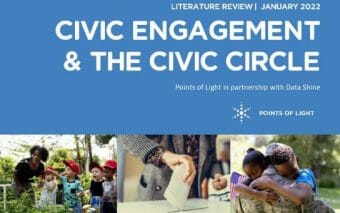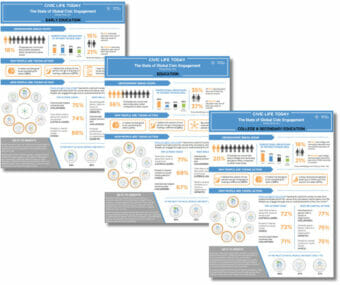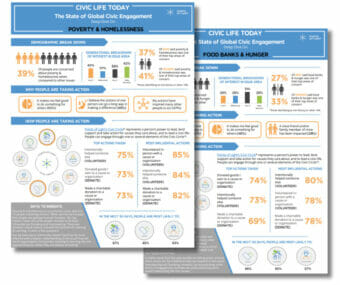Points of Light's Civic Engagement Research
Our research explores attitudes, barriers and participation rates around community engagement with the goal of increasing people, companies and organizations to inspire and take action all over the world.
- Leading Locally: Small Business and Social Change | Published June 2023
- Data Deep Dives | Ongoing Series Published Throughout 2023
- Civic Life Today
- The State of Global Civic Engagement | Published April 2022
- A Millennial Perspective | Published September 2021
- A Look at American Civic Engagement Amid a Global Pandemic | Published September 2020
- Civic Engagement & The Civic Circle Literature Review | Published January 2022
Leading Locally:
Small Business and Social Change
Now Available | Published June 6, 2023
Building on Points of Light’s body of civic engagement research, “Leading Locally: Small Business and Social Change” explores the expectations, perceptions and ways in which small businesses are taking action to support social issues and their communities. Regardless of size, companies, their employees and stakeholders can drive transformative social change when they work at the intersection of community needs, employee interests and company resources and priorities.
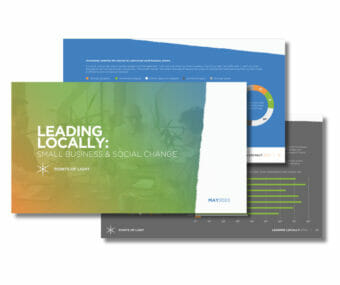
Data Deep Dives
Published 2023
Points of Light brings you Data Deep Dives, a closer look at our own civic learning research that sheds light on trends in key cause areas. Each category (on the left) features a variety of relevant topics. New Data Deep Dives will be added monthly throughout 2023.
Strong employment opportunities and healthy wages have a singular ability to transform the lives of individuals, their families and communities at large. They can boost local economies, create safer neighborhoods, increase civic engagement and foster more prosperous societies.
And while we may be living in a time of global anxiety about inflation and a potential recession, we – as individuals and companies – have the power to change the current status quo on issues like employment and wages. We can use our collective voices, resources, knowledge and time to create a brighter, more financially secure future for all.
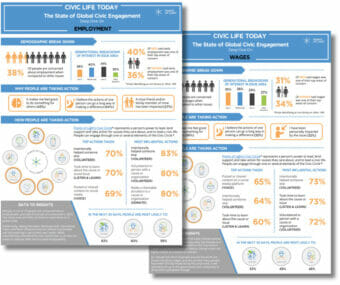
Learn More
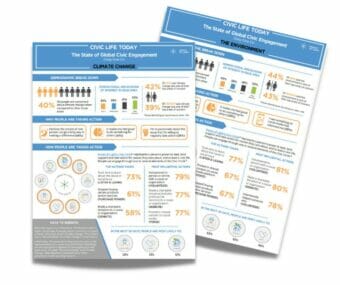
Education was one of the top five issue areas of concern across all four countries surveyed by Points of Light. This is perhaps unsurprising given the particular impact of the COVID-19 pandemic on education systems. At one point, 94% of children were out of school, and this will have a rippling effect for years to come. It’s no wonder that 40% of Gen Z respondents, born from 1997 to 2012, said this was an area of top concern, as they were the generation most directly impacted.
Making strides in education can mean getting involved in a variety of ways including voting on policies that support and influence the educational system, volunteering in classrooms or after school programs, serving on school boards or as part of national service organizations focused on education and using our voices to support educators and advocate for school-aged children.
Knowing that under-resourced communities are often some of the most overlooked, nonprofit organizations around the world are focused on tackling issues that often affect them like poverty, homelessness and food insecurity. These organizations, along with the volunteers and businesses that support them, lend their time, talent and resources to addressing these tough issues through volunteering, donating and using their voice – all elements of the Points of Light Civic Circle®.
The Civic Circle framework is an essential tool that not only opens more pathways to civic engagement, it allows you to make your activism and advocacy work even more impactful. One of the best places to start is by listening and learning. With that in mind, let’s look at some lessons learned from our Points of Light research on these cause areas.
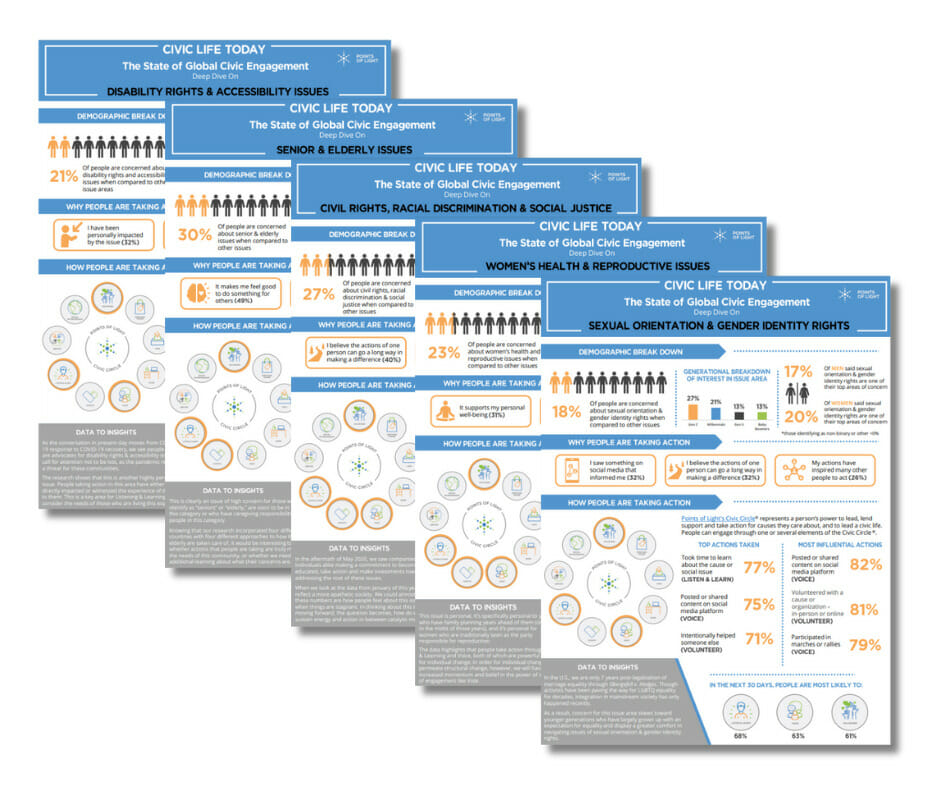
Equity and social justice aren’t just buzzwords in the landscape of service and civic engagement. These issues touch everyone in society in some way, regardless of age, gender, race or socioeconomic status – though the degree of their impact may vary based on individual identity. We all have a responsibility to face these issues and build a more equitable world better for everyone.
When examining equity among various groups, our civic activism research shows us how people are getting engaged with social justice efforts. Whether you yourself are part of a marginalized community or you’re able to advocate for those who are, these insights can inform how you work with your community as you work toward a more just and inclusive society.
Learn More
Over the past several decades, mental health has come to the forefront of conversations about overall health – for school students and employees in workplaces, for professional athletes and entertainers, and for healthcare workers themselves.
Aside from diagnosed mental health disorders, there are a host of reasons that anyone might feel depression, anxiety, malaise or overwhelm. Current-day threats to our safety include incredibly complex civic and community engagement challenges like gun violence, domestic violence, COVID-19 and more.
Learn More
The environment affects us all, which is why having insight into this issue can help you drive the change you want to see in your own community.
Points of Light’s research shows that 40% of people are concerned about climate change when compared to other issue areas, and 43% of people are concerned about the environment when compared to other issue areas. This difference is likely due to the politicization of climate change in recent years.

Learn More
Strong employment opportunities and healthy wages have a singular ability to transform the lives of individuals, their families and communities at large. They can boost local economies, create safer neighborhoods, increase civic engagement and foster more prosperous societies.
And while we may be living in a time of global anxiety about inflation and a potential recession, we – as individuals and companies – have the power to change the current status quo on issues like employment and wages. We can use our collective voices, resources, knowledge and time to create a brighter, more financially secure future for all.

Learn More

Education was one of the top five issue areas of concern across all four countries surveyed by Points of Light. This is perhaps unsurprising given the particular impact of the COVID-19 pandemic on education systems. At one point, 94% of children were out of school, and this will have a rippling effect for years to come. It’s no wonder that 40% of Gen Z respondents, born from 1997 to 2012, said this was an area of top concern, as they were the generation most directly impacted.
Making strides in education can mean getting involved in a variety of ways including voting on policies that support and influence the educational system, volunteering in classrooms or after school programs, serving on school boards or as part of national service organizations focused on education and using our voices to support educators and advocate for school-aged children.
Knowing that under-resourced communities are often some of the most overlooked, nonprofit organizations around the world are focused on tackling issues that often affect them like poverty, homelessness and food insecurity. These organizations, along with the volunteers and businesses that support them, lend their time, talent and resources to addressing these tough issues through volunteering, donating and using their voice – all elements of the Points of Light Civic Circle®.
The Civic Circle framework is an essential tool that not only opens more pathways to civic engagement, it allows you to make your activism and advocacy work even more impactful. One of the best places to start is by listening and learning. With that in mind, let’s look at some lessons learned from our Points of Light research on these cause areas.

Equity and social justice aren’t just buzzwords in the landscape of service and civic engagement. These issues touch everyone in society in some way, regardless of age, gender, race or socioeconomic status – though the degree of their impact may vary based on individual identity. We all have a responsibility to face these issues and build a more equitable world better for everyone.
When examining equity among various groups, our civic activism research shows us how people are getting engaged with social justice efforts. Whether you yourself are part of a marginalized community or you’re able to advocate for those who are, these insights can inform how you work with your community as you work toward a more just and inclusive society.
Learn More
Over the past several decades, mental health has come to the forefront of conversations about overall health – for school students and employees in workplaces, for professional athletes and entertainers, and for healthcare workers themselves.
Aside from diagnosed mental health disorders, there are a host of reasons that anyone might feel depression, anxiety, malaise or overwhelm. Current-day threats to our safety include incredibly complex civic and community engagement challenges like gun violence, domestic violence, COVID-19 and more.
Learn More
The environment affects us all, which is why having insight into this issue can help you drive the change you want to see in your own community.
Points of Light’s research shows that 40% of people are concerned about climate change when compared to other issue areas, and 43% of people are concerned about the environment when compared to other issue areas. This difference is likely due to the politicization of climate change in recent years.

Learn More
Civic Life Today:
The State of Global Civic Engagement
Published April 2022
Points of Light’s research, “Civic Life Today: The State of Global Civic Engagement,” is mapped out in five in-depth reports that show key trends in civic engagement and provide actionable takeaways for businesses, non-profits and individuals.
Findings from the study revealed several themes around what global civic engagement looks like today:
- Volunteering is ranked among the most important activities since the COVID-19 pandemic began, but by varying degrees among countries.
- Globally, individuals share most interest in supporting education, environment and healthcare.
- Finances remain one of the largest barriers to engagement.
- Corporations have an obligation to act.
- Nontraditional forms of engagement are the new normal.
Download this comprehensive and cutting-edge research that offers global perspective as well as metrics from the U.S., the U.K, Brazil and India.
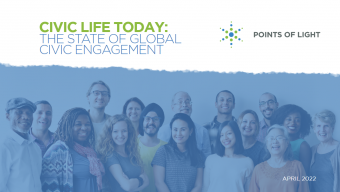
Civic Life Today:
A Millennial Perspective
Published September 2021
In 2021, Points of Light focused its research on the civic engagement of millennials. This report, titled “Civic Life Today: A Millennial Perspective,” shares how a concentration of extraordinary experiences in a brief period of time influenced the civic involvement of the country’s largest generation in history.
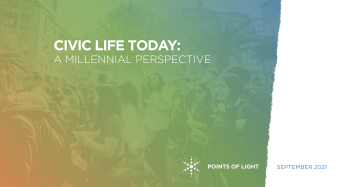
Civic Life Today:
A Look at American Civic Engagement Amid a Global Pandemic
Published September 2020
“Civic Life Today: A Look At American Civic Engagement Amid A Global Pandemic” reveals the potential of the tragedy of the pandemic to serve as a catalyst for a new era of civic engagement. Today’s engaged person may express their inclination to do good through the purchases they make, in what they share on social media, where and how they choose to work and which nonprofit organization to support as a volunteer or donor.

Civic Engagement & The Civic Circle Literature Review
Published January 2022
In Partnership with Data Shine
In Partnership with Data Shine
To better understand civic engagement and how to motivate individuals and communities to become more engaged, Points of Light commissioned Data Shine, an independent evaluation consulting firm, to conduct a literature review. We paired the Civic Circle framework with an exploratory, inductive approach that allowed the research team to expand the search in real-time. This led us to scholarly journals, news sources, think tank and poll briefings organizational reports, white papers, book chapters, practitioner-focused guides and more. The search produced more than 260 artifacts; we referenced 198 in the synthesis. Our web library contains access to reviewed resources as possible.
